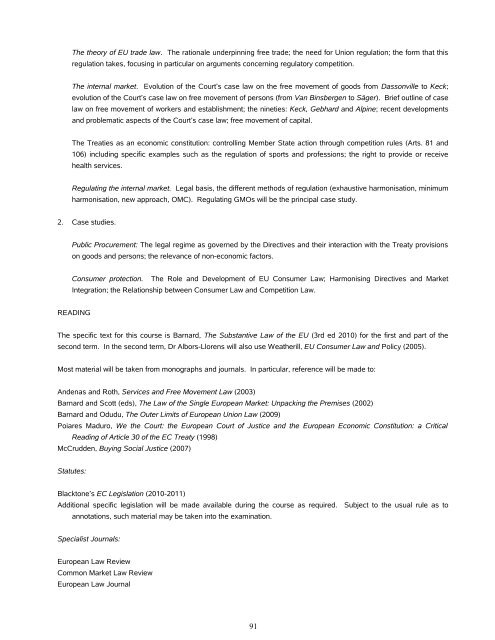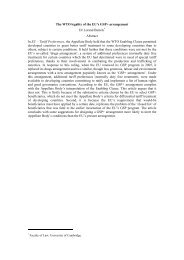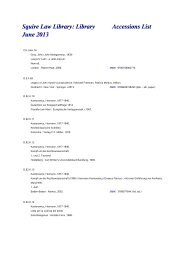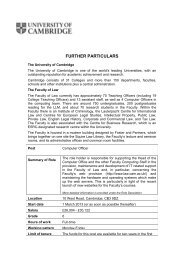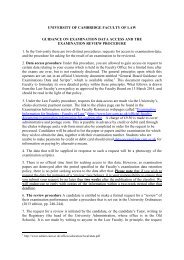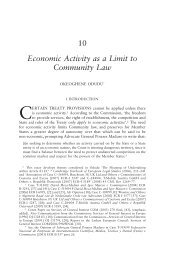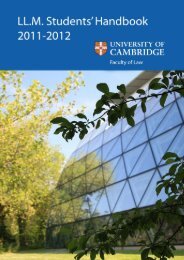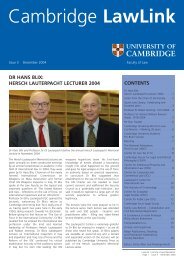Contents - Faculty of Law - University of Cambridge
Contents - Faculty of Law - University of Cambridge
Contents - Faculty of Law - University of Cambridge
You also want an ePaper? Increase the reach of your titles
YUMPU automatically turns print PDFs into web optimized ePapers that Google loves.
The theory <strong>of</strong> EU trade law. The rationale underpinning free trade; the need for Union regulation; the form that thisregulation takes, focusing in particular on arguments concerning regulatory competition.The internal market. Evolution <strong>of</strong> the Court’s case law on the free movement <strong>of</strong> goods from Dassonville to Keck;evolution <strong>of</strong> the Court’s case law on free movement <strong>of</strong> persons (from Van Binsbergen to Säger). Brief outline <strong>of</strong> caselaw on free movement <strong>of</strong> workers and establishment; the nineties: Keck, Gebhard and Alpine; recent developmentsand problematic aspects <strong>of</strong> the Court’s case law; free movement <strong>of</strong> capital.The Treaties as an economic constitution: controlling Member State action through competition rules (Arts. 81 and106) including specific examples such as the regulation <strong>of</strong> sports and pr<strong>of</strong>essions; the right to provide or receivehealth services.Regulating the internal market. Legal basis, the different methods <strong>of</strong> regulation (exhaustive harmonisation, minimumharmonisation, new approach, OMC). Regulating GMOs will be the principal case study.2. Case studies.Public Procurement: The legal regime as governed by the Directives and their interaction with the Treaty provisionson goods and persons; the relevance <strong>of</strong> non-economic factors.Consumer protection.The Role and Development <strong>of</strong> EU Consumer <strong>Law</strong>; Harmonising Directives and MarketIntegration; the Relationship between Consumer <strong>Law</strong> and Competition <strong>Law</strong>.READINGThe specific text for this course is Barnard, The Substantive <strong>Law</strong> <strong>of</strong> the EU (3rd ed 2010) for the first and part <strong>of</strong> thesecond term. In the second term, Dr Albors-Llorens will also use Weatherill, EU Consumer <strong>Law</strong> and Policy (2005).Most material will be taken from monographs and journals. In particular, reference will be made to:Andenas and Roth, Services and Free Movement <strong>Law</strong> (2003)Barnard and Scott (eds), The <strong>Law</strong> <strong>of</strong> the Single European Market: Unpacking the Premises (2002)Barnard and Odudu, The Outer Limits <strong>of</strong> European Union <strong>Law</strong> (2009)Poiares Maduro, We the Court: the European Court <strong>of</strong> Justice and the European Economic Constitution: a CriticalReading <strong>of</strong> Article 30 <strong>of</strong> the EC Treaty (1998)McCrudden, Buying Social Justice (2007)Statutes:Blacktone’s EC Legislation (2010-2011)Additional specific legislation will be made available during the course as required. Subject to the usual rule as toannotations, such material may be taken into the examination.Specialist Journals:European <strong>Law</strong> ReviewCommon Market <strong>Law</strong> ReviewEuropean <strong>Law</strong> Journal91


